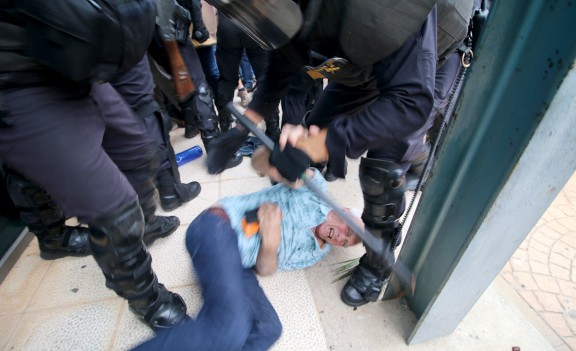Aquesta informació es va publicar originalment el 18 de setembre de 2019 i, per tant, la informació que hi apareix fa referència a la data especificada.
Losing an election hurts. Losing a referendum hurts even more, because in contrast to general elections, referendums are one-off events. Many democracies use referendums as tools to settle political conflict (Qvortrup 2014). Especially when it comes to fundamental issues such as national sovereignty, plebiscites represent a once-in-generation opportunity. This is why losers have it a lot harder to recover from defeat in referendums than in elections. The pro-independence movement in Canada’s French-speaking Québec region has had this experience. After a clear defeat in the 1980 vote, it took the independence movement 15 years to reach a second referendum. Since a narrow loss in 1995, the independence issue has lost salience and vanished from the top of the region's political agenda (Lecours 2018).
It may seem that, in liberal democracies, when referendums on independence result in a defeat for separatists, the issue is tabled for a long time (Dion 1996). This is not surprising since secession is a serious matter questioning the foundation of the nation state.
After a negative vote on independence, the status quo is solidified and the agenda returns to "normal politics". Citizens shift their attention to other issues. Pro-independence groups might come to see the no-vote as a dead-end for their cause and move toward more moderate stances. As a consequence, support for independence is expected to decline after a failed campaign. What is the current situation in Scotland and Catalonia after they failed to secede from the UK and Spain respectively?

Labour MEP Catherine Stihler campaigning in favour of 'no' in Glasgow, 2014. Foto: Jordi Borràs.
Support for secessionist movements is often seen as a consequence of national identity or economic expectations (Muñoz and Tormos 2015). However, citizens also make calculations whether independence is a realistic goal. Hence,
pro-independence leaders must convince their supporters that there will be another opportunity for secession, but credible claims depend very much on the political situation after defeat in a referendum.
In Scotland, support for independence remains unfazed. In April of 2019, polls showed that
49% of Scottish voters still back secession from the UK. Even more surprising is that,
only five years after the last referendum, Scotland might have another vote soon. As recent as this spring, Scottish First Minister Nicola Sturgeon announced plans to hold another referendum on independence before May 2021.
The explanation for why Scots have not lost their appetite for independence can be boiled down to a single word:
Brexit. In the 2016 UK-wide referendum, most Scots voted to remain in the EU.
The prospect of leaving the EU on October 31 has revived the debate on Scottish independence, as many Scots feel that Brexit has been imposed on them by the rest of the UK. First Minister Sturgeon holds that a second referendum would give Scotland
"the opportunity to choose to be an independent European nation". In this case, a vote for independence would take on a very different meaning, since it would be interpreted as preserving the status quo and the privileges associated with EU membership – which might be much more appealing to many voters than choosing to leave the UK. Thus,
Brexit has completely changed the scenario for Scottish independence supporters after the clear defeat in the 2014 referendum.
In Catalonia, too, the referendum did not settle the independence issue either. This is mainly because, in contrast to the UK and Canada, the Spanish government strictly denied the binding character of the 1st October 2017 (1-O) referendum and blocked a political solution for the conflict. In this context, the 1-O must be understood as a massive act of civil disobedience, rather than a final decision on independence. For some time, it seemed that police violence, imprisonment, and other forms of state repression have only intensified people’s support for secession -instead of deterring from it. After the 1-O, support for an independent Catalonia rose as high as 48.7 percent when polled as a binary yes or no question.

Spanish police officers trying to withdraw the 2017 referendum ballot boxes in La Ràpita, hitting whoever they found in the electoral college. Foto: Sofia Cabanes.
However, in the last polls published in July 2019 by the Centre d'Estudis d'Opinió, support for independence
has dropped to 44 percent (PDF), the lowest rate since before the referendum. While single data points should be interpreted with great care, it might be an indicator that Catalans are becoming disenchanted with secession.
Researchers have shown that mass mobilization comes in cycles (Tarrow 2011): after phases of intense conflict, activists get exhausted and it becomes harder to sustain collective action. This is particularly problematic for the Catalan movement, because civil society has played a bigger role in pushing for a referendum than in Scotland or Québec. There is no consensus among political parties nor activists about the strategy of the movement going forward after the 1-O.
Unlike in Scotland, a game-changer like Brexit has not occurred in Spanish politics. Hopes that a new PSOE government in Madrid might be more open to negotiate have vanished after its leader Pedro Sánchez has made clear he has no intention to at least sit down and talk about the possibility of a referendum. Given the almost absolute closure of the Spanish political system for independence demands and the lack of international support,
an official binding referendum does not seems likely to occur in the near future. In such a dead-end situation, supporters might lose their faith that another chance for independence is yet to come.
What do we learn from all this?
Referendums in liberal democracies seldom result in secession, but the cases of Catalonia and Scotland show that sometimes they do not settle the national conflict either. In fact, in both regions, the referendums led to spikes in supports for independence. However, maintaining support over a longer period of time is more difficult. Citizens must be convinced that there is another chance to achieve their goal. In Scotland, Brexit has created such an opportunity, but in Catalonia, anything similar seems far away.
References
- Dion, Stephane. 1996. "Why Is Secession Difficult in Well-Established Democracies? Lessons from Quebec."
British Journal of Political Science 26(2): 269–83.
- Lecours, André. 2018. "The Political Consequences of Independence Referenda in Liberal Democracies: Quebec, Scotland, and Catalonia."
Polity 50(2): 243–74.
- Muñoz, Jordi, and Raül Tormos. 2015. "Economic Expectations and Support for Secession in Catalonia: Between Causality and Rationalization."
European Political Science Review 7(02): 315–41.
- Qvortrup, Matt. 2014. "Referendums on Independence, 1860-2011."
The Political Quarterly 85(1): 57–64.
- Tarrow, Sidney G. 2011.
Power in Movement: Social Movements and Contentious Politics. Rev. & updated 3rd ed. New York: Cambridge University Press.

 per Hans Jonas Gunzelmann, PhD Candidate in Political Science and Sociology at Scuola Normale Superiore | 18 de setembre de 2019 a les 13:40 |
per Hans Jonas Gunzelmann, PhD Candidate in Political Science and Sociology at Scuola Normale Superiore | 18 de setembre de 2019 a les 13:40 |

